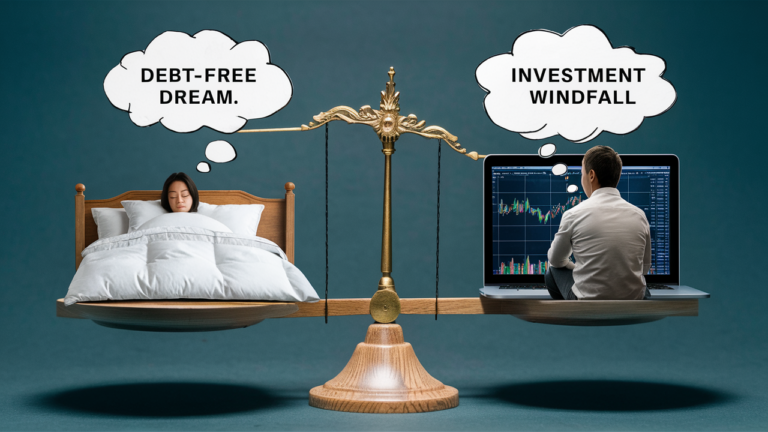We all dream of financial freedom, but the path to achieving it can be a winding road filled with tough choices. Today’s “Would You Rather” on DilemmaBox.com throws you right into the heart of this dilemma: Debt-Free Dream or Investment Windfall?
Imagine waking up tomorrow with a magic financial wand. In one swipe, it could eliminate all your outstanding debt – credit cards, student loans, that lingering car payment – leaving you feeling lighter and breathing a sigh of pure relief. Or, with a flick of the wrist, the wand could supercharge your savings, depositing a substantial sum ready to be invested for future growth.
This isn’t just a fantasy; it’s a real choice many of us face. Do you prioritize the immediate peace of mind of being debt-free, or gamble on the potential for greater wealth down the line? This article will delve into the pros and cons of each option, helping you navigate this critical “Would You Rather” and move closer to your own personal definition of financial freedom.

- The Freedom of Zero: Breaking the Chains of Debt
- Sleeping Soundly: The Peace of a Debt-Free Life
- Compounding Cash: The Power of Early Investment
- Future Fortune: Investing for Long-Term Growth
- Guaranteed Gain vs. Potential Windfall: Weighing the Risks
- Debt-Free Springboard: Investing with Peace of Mind
- Lifestyle vs. Legacy: Prioritizing Your Goals
- The Right Choice for You: Navigating Your Financial Freedom Path
The Freedom of Zero: Breaking the Chains of Debt
Imagine a world where every paycheck isn’t a constant tug-of-war between necessities and that nagging credit card bill. A world where you can finally breathe easy, knowing every dollar earned goes towards building your future, not paying down yesterday’s purchases. This, my friends, is the Freedom of Zero. It’s the exhilarating feeling of being completely debt-free, a state that offers a wealth of benefits beyond just a clean financial slate.
The constant pressure of debt weighs heavily on us. It can be a source of stress and anxiety, robbing us of joy and hindering our ability to focus on the present. But eliminating debt lifts that burden. It’s like shedding a heavy cloak, allowing you to stand tall and face the future with newfound confidence.
Peace of Mind is Priceless: The constant worry about minimum payments, late fees, and rising interest rates melts away when you’re debt-free. You can finally sleep soundly at night, knowing your finances are under control. This feeling of security allows you to focus on other aspects of your life, like your relationships, career goals, or simply enjoying the present moment without a financial cloud hanging over your head.
Breaking the Cycle of Dependence: High-interest debt can feel like a never-ending cycle, where you’re constantly fighting against the tide. Eliminating that debt breaks the cycle, allowing you to take control of your finances. Any extra money you previously used for debt payments can now be directed towards important goals like building an emergency fund, saving for a down payment on a house, or investing for your future.
Budgeting Gets Easier: Debt can strangle your budget, leaving little wiggle room for savings or unexpected expenses. Being debt-free allows you to create a more flexible budget. You can allocate funds towards savings goals, splurge on that well-deserved vacation, or simply have more breathing room for life’s little surprises.
Improved Credit Score: Regularly paying down debt and ultimately achieving the Freedom of Zero positively impacts your credit score. This opens doors to better interest rates on loans, credit cards with more rewards, and potentially lower insurance premiums. A good credit score empowers you to make bigger financial decisions with confidence.
The Freedom to Pursue Your Dreams: With debt out of the equation, you have the financial freedom to chase your dreams. Whether it’s starting a business, going back to school, or taking that extended trip you’ve always dreamed of, the constraints of debt no longer hold you back.
However, the Freedom of Zero isn’t the only path to financial freedom. There’s another option: investing your savings for potential future returns. This presents its own set of advantages and drawbacks, which we’ll explore in the next section. But for now, take a moment to envision the feeling of liberation that comes with being debt-free. It’s a powerful motivator on the road to financial empowerment.
Sleeping Soundly: The Peace of a Debt-Free Life

Imagine tossing and turning at night, not because your mattress is uncomfortable, but because the weight of debt is pressing down on you. Overdue bills whisper accusations, late fees loom like dark shadows, and the constant worry about how you’ll make ends meet keeps sleep at bay. Now, picture a different scenario. You drift off peacefully, enveloped in the tranquility of a debt-free life. This, my friends, is the power of a good night’s sleep fueled by financial security.
Debt, especially high-interest debt, acts like a financial stressor, constantly gnawing at our peace of mind. Every missed payment notification, every late fee, and every reminder of a looming deadline chips away at our well-being. This constant strain can have a significant impact on our sleep quality. When we’re worried about finances, it’s difficult to switch off and achieve deep, restorative sleep.
Sleep: The Foundation of a Healthy Life: Sleep is not a luxury; it’s a biological necessity. When we’re well-rested, we have better focus, improved cognitive function, and a stronger immune system. We’re also more resilient to stress and better equipped to handle life’s challenges. Chronic sleep deprivation, on the other hand, brings a host of health problems, from impaired decision-making to an increased risk of chronic diseases. The financial burden of debt can significantly disrupt this vital process.
Breaking Free from the Worry Cycle: Being debt-free disrupts the worry cycle that keeps you up at night. You’re no longer haunted by the “what ifs” – what if I can’t make the next payment? What if I lose my job? What if an unexpected expense arises? With debt eliminated, these anxieties fade away, allowing you to rest easier.

The Power of a Budget You Can Trust: Debt can wreak havoc on your budget, leaving little wiggle room for unexpected expenses. This uncertainty can be a significant source of stress, keeping you up at night wondering if you’ll have enough to cover everything. But a debt-free budget is a reliable one. You know exactly how much money you have coming in and going out, allowing you to sleep soundly knowing you can cover your essential expenses and plan for the future without financial anxieties.

The Domino Effect of Financial Security: Financial security fosters a sense of overall well-being. Knowing you’re not teetering on the edge financially allows you to focus on other aspects of your life with a clearer mind. You can build positive relationships, pursue your passions, and face the future with confidence. This sense of control over your finances translates into a profound sense of peace of mind, lulling you into a deeper, more restful sleep.
It’s Not Just About Sleep: While a good night’s sleep is crucial, the peace of a debt-free life extends far beyond catching those precious Zzz’s. It empowers you to make better financial decisions, allowing you to plan for the future, invest for retirement, or pursue further education without the constant worry about debt repayments. It’s a freedom that allows you to wake up feeling refreshed and ready to tackle the day’s challenges, knowing your financial house is in order.
However, achieving financial freedom doesn’t have to come solely from being debt-free. The potential for future wealth through investing presents an alternative path. But with the potential for reward also comes risk. This brings us to the next chapter in our exploration of the “Would You Rather” of financial freedom: Sleeping Soundly vs. Chasing Investment Windfalls.
Compounding Cash: The Power of Early Investment

Imagine a scenario where your money not only works for you but also works harder for you over time, multiplying itself seemingly out of thin air. This magical phenomenon is called compounding interest, and it’s the cornerstone of the “Compounding Cash” approach to financial freedom. It’s a strategy that prioritizes starting early and investing consistently, allowing your money to grow exponentially over the long term.
While eliminating debt brings immediate peace of mind, investing focuses on building long-term wealth. Time is your greatest ally in this strategy. The earlier you start investing, the more time your money has to benefit from compounding. It’s like planting a seed – the sooner you plant it, the bigger the tree it will eventually become.

The Magic of Compounding: Let’s break down the magic of compounding. Imagine you invest $1,000 at a 7% annual interest rate. After one year, you’ll earn $70 in interest, bringing your total to $1,070. But here’s the kicker: in year two, you’ll earn interest not just on the initial $1,000, but also on the $70 of interest earned in year one. This snowball effect, where your returns generate even more returns, is the power of compounding. Over time, even small contributions can grow into a substantial sum.
Starting Early Pays Off Big Time: The power of compounding becomes even more significant the earlier you start. Let’s say you begin investing $500 every month at a 7% annual interest rate. Here’s the difference a few years can make:
- 20 Years: After 20 years, your total contribution will be $120,000. However, thanks to compounding, your investment will be worth an impressive $431,487.
- 30 Years: Fast forward another decade, and your total contribution reaches $180,000. But the magic of compounding takes hold, pushing your total investment value to a staggering $1,040,022.
As you can see, starting early allows compounding to work its magic for a longer period, leading to a significantly larger nest egg.
Investing for Multiple Goals: Compounding cash isn’t just about retirement planning. It can be used to achieve a variety of financial goals. Maybe it’s a down payment on a house, funding your child’s education, or taking that dream vacation. Early and consistent investment allows you to build a financial cushion for these important milestones.
Discipline is Key: The key to benefiting from compounding is discipline. It’s about consistently investing a portion of your income, regardless of market fluctuations. This “set it and forget it” approach allows you to ride out market ups and downs, knowing that over time, the trend will be upward.
Investing vs. Debt Repayment: There’s a trade-off between debt repayment and investing. While eliminating debt guarantees a fixed return (the interest you’re no longer paying), investing offers the potential for higher returns through compounding.
Ultimately, the choice depends on your financial situation, risk tolerance, and goals. If you’re burdened by high-interest debt, prioritizing repayment might be the best course of action. However, if you’ve already tackled your debt, or have manageable debt with low interest rates, investing can be a powerful tool for long-term wealth creation.
In the next part of our “Would You Rather” journey, we’ll explore the potential windfalls of investing but also acknowledge the inherent risks involved.
Future Fortune: Investing for Long-Term Growth
Imagine yourself in the future, financially secure and independent. Perhaps you’re enjoying a well-deserved retirement, traveling the world, or simply living comfortably knowing you’ve built a solid financial foundation. This future scenario can be achieved through Future Fortune, a strategy that prioritizes investing for long-term growth. Here, your focus shifts from immediate debt relief to the potential for significant wealth creation over an extended period.
While paying off debt offers a guaranteed return (the interest you no longer pay), investing presents the opportunity for potentially much higher returns. The stock market, historically, has averaged annual returns of around 7-10%. Imagine what compounding interest can do to your money over 20, 30, or even 40 years!
The Potential for Windfalls: With investing comes the exciting possibility of striking it rich. While not guaranteed, successful investments can dramatically increase your wealth. Think of past success stories like tech giants or innovative startups. A well-timed investment in these companies could have turned a modest sum into a significant fortune.

Building a Diversified Portfolio: The key to minimizing risk while maximizing potential returns lies in diversification. This means spreading your investments across different asset classes, such as stocks, bonds, real estate, and commodities. By diversifying, you’re not putting all your eggs in one basket. If one investment performs poorly, the others can help to offset the losses.
Investing for Different Goals: Investing isn’t just about chasing a single dream. You can tailor your investment strategy to achieve various financial goals. For example, a more aggressive portfolio with a higher percentage of stocks might be suitable for a long-term goal like retirement, while a more conservative portfolio with bonds might make sense for a shorter-term goal like a down payment on a house.
Patience is a Virtue: Investing is a marathon, not a sprint. The stock market is inherently volatile, experiencing periods of both growth and decline. However, history shows that over the long term, the trend is upward. The key is to remain patient and stay invested, avoiding the temptation to panic sell during market downturns.
Knowledge is Power: Educating yourself about the different investment options is crucial for success. Research different asset classes, understand the risks and rewards involved, and consider seeking professional financial advice. The more you know, the better equipped you’ll be to make informed investment decisions.
Investing vs. Debt Freedom: Remember, the “Would You Rather” scenario presents a dilemma. While investing holds the potential for greater wealth creation, it also comes with inherent risks. The stock market can fluctuate, and there’s no guarantee of success. On the other hand, paying off debt offers a guaranteed return (the interest you’re no longer paying) and eliminates the stress of financial obligations.
Ultimately, the best strategy depends on your personal circumstances and risk tolerance. If you have high-interest debt, prioritizing repayment might be the wisest course of action. However, if you’ve already tackled your debt or have manageable low-interest debt, investing can be a powerful tool for building long-term wealth and securing your Future Fortune.
The next piece in the “Would You Rather” puzzle explores the potential pitfalls of focusing solely on investment for future gains. We’ll discuss the risks involved and consider a more balanced approach to financial freedom.
Guaranteed Gain vs. Potential Windfall: Weighing the Risks
Imagine yourself standing at a financial crossroads. One path leads to the immediate peace of mind and security of Guaranteed Gain. This path involves paying off all your debt – the credit cards, student loans, and any other lingering debts that weigh heavily on your shoulders. With each payment, you chip away at the burden, inching closer to the liberation of a debt-free life.
The other path beckons with the allure of a Potential Windfall. This path leads through the world of investments, where you channel your savings into stocks, bonds, or other assets in the hope of achieving significant financial gains. Here, the promise of a future overflowing with wealth can be intoxicating.
But before you take either path, consider this: both choices come with inherent risks.
The Comfort of Certainty: Eliminating debt offers a guaranteed gain. It’s a clear path with a predictable outcome – a future free from the shackles of debt payments. This certainty provides enormous peace of mind. You’ll no longer face the constant stress of mounting interest and late fees. Additionally, a debt-free life frees up previously allocated funds, allowing you to invest for the future or build a healthy emergency fund.
The Uncertain Thrill of Investment: Investing, on the other hand, doesn’t offer guarantees. The stock market can be a rollercoaster ride, with ups and downs that can be nerve-wracking. Investing comes with the risk of losing money, especially if you don’t diversify your portfolio or make rash decisions based on market volatility. The potential windfall of a successful investment can be significant, but the path to get there is far from certain.
Risk vs. Reward: The crucial factor to consider is your risk tolerance. Some individuals are comfortable with the volatility of the stock market and are willing to accept the potential for losses in pursuit of high returns. Others prefer the security and predictability of paying off debt, even if it means sacrificing the chance for a potentially larger financial payoff.
The Age Factor: Your age also plays a role in this decision. If you’re young with a long-term investment horizon, you can weather market downturns and potentially benefit from compounding interest. However, if you’re nearing retirement, you may have less time to recover from market losses and might prioritize the immediate peace of mind of being debt-free.
Finding the Balance: There’s no one-size-fits-all answer to the “Would You Rather” of debt repayment vs. investment. The best approach might be a combination of both. You can allocate a portion of your income towards debt repayment, particularly high-interest debt, while also investing a portion for long-term wealth creation. This balanced strategy allows you to achieve a sense of security while also leaving the door open for future financial gains.
Seeking Professional Help: Ultimately, navigating this financial crossroads can be challenging. Consider seeking professional financial advice from a certified planner. They can assess your individual circumstances, risk tolerance, and financial goals, and help you develop a personalized strategy that balances debt repayment with an investment plan for your future.
In the final part of our “Would You Rather” journey, we’ll explore how prioritizing your lifestyle goals can contribute to a more holistic approach to financial freedom.
Debt-Free Springboard: Investing with Peace of Mind
Imagine achieving the best of both worlds: the Debt-Free Springboard. This strategy combines the immediate peace of mind and security of eliminating debt with the long-term potential for wealth creation through calculated investment. Here, you prioritize getting out of debt, but you don’t stop there. You leverage your debt-free status as a springboard, propelling you towards a future built on both financial security and the potential for future growth.
The Power of a Clean Slate: Eliminating debt isn’t just about financial freedom; it’s about psychological liberation. With each debt payment, you chip away at the stress and anxiety that often accompany financial obligations. Once debt-free, you can breathe easier, knowing your income goes towards building a secure future, not paying off yesterday’s purchases. This newfound security allows you to focus more clearly on your investment strategy.
Investing with Confidence: Debt payments can significantly limit your available capital for investment. But once you’re debt-free, more of your income becomes “investable” money. This increased financial flexibility allows you to start investing sooner and contribute more consistently, maximizing the power of compounding interest. Furthermore, being debt-free reduces your reliance on high-interest debt to cover unexpected expenses, allowing you to invest with greater confidence and a longer-term perspective.
Building a Sustainable Budget: Debt repayments can wreak havoc on your budget, leaving little room for saving or unexpected expenses. Becoming debt-free frees up a significant portion of your income, allowing you to create a more sustainable budget. This means you can allocate funds for future investments while still having room for your day-to-day expenses and a healthy emergency fund.
Reduced Financial Stress: The stress of managing debt can significantly impact your overall well-being. Knowing you’re debt-free reduces financial strain, allowing you to focus on other areas of your life. This improved mental well-being can also lead to better decision-making when it comes to investment strategies, allowing you to approach the market with a clearer head.
Finding the Right Investment Mix: Being debt-free doesn’t mean you have to go all-in on risky investments. With your financial foundation secure, you can adopt a more balanced investment approach. For instance, you might invest a portion of your freed-up income in a diversified portfolio for long-term growth, while allocating another portion to more conservative options, ensuring access to readily available funds for short-term needs.
It’s Not Just About Money: Financial freedom isn’t just about having a lot of money; it’s about having options and living a life that aligns with your values. Being debt-free allows you to pursue your passions and goals without the constraints of financial obligations. This freedom can lead to a more fulfilling and enriching life, making the journey towards financial security even more rewarding.
The Debt-Free Springboard isn’t a one-size-fits-all approach. Some individuals might prioritize complete debt elimination before investing even a single dollar. However, this strategy offers a compelling argument for considering a balanced approach. By eliminating debt first, you create a secure foundation from which you can launch yourself towards a future filled with both peace of mind and the potential for substantial wealth creation.
Lifestyle vs. Legacy: Prioritizing Your Goals in the “Would You Rather” of Financial Freedom
The path to financial freedom isn’t a straight line; it’s a crossroads where two distinct visions for the future collide. On one hand, you have the Lifestyle path, a path that prioritizes living comfortably in the present, enjoying the fruits of your labor, and prioritizing experiences over material possessions. On the other hand, lies the Legacy path, focusing on building wealth for the future, securing your retirement, and potentially leaving something behind for your loved ones.
Living for Today: The Lifestyle path embraces the philosophy of “you only live once.” It prioritizes spending your money on experiences that bring you joy, whether it’s traveling the world, indulging in hobbies, or simply living comfortably in the present. Proponents of this approach believe that financial freedom is about having the flexibility and resources to pursue your passions and live life on your own terms, not just accumulating wealth for an uncertain future.
Finding the Balance: Even when prioritizing a comfortable lifestyle, responsible financial planning is still crucial. This involves building an emergency fund to weather unexpected expenses, saving for essential future needs like a down payment on a house, and perhaps even contributing a modest amount towards retirement. The key here is finding a balance, ensuring you can enjoy the present without jeopardizing your future.
The Power of Delayed Gratification: The Legacy path embraces the concept of delayed gratification. This approach encourages prioritizing saving and investing for the future, even if it means sacrificing some present-day luxuries. By consistently investing a portion of your income, you build a nest egg for retirement, provide for your children’s education, or even leave a legacy for future generations.
Security and Peace of Mind: The Legacy path offers financial security and peace of mind. Knowing you’ve built a solid financial foundation allows you to approach the future with greater confidence. You can potentially retire early, knowing your income needs are covered, and have the freedom to help your loved ones without financial strain.
Defining Your Legacy: Legacy isn’t just about financial assets. It can be about leaving a positive impact on the world, passing on your knowledge and values to future generations, or simply creating cherished memories for your loved ones.
Finding Your “Would You Rather” Sweet Spot: Ultimately, the choice between Lifestyle and Legacy is a personal one. Some individuals might find a happy medium, balancing present-day enjoyment with responsible planning for the future. Your risk tolerance, age, and family situation all play a role in determining the best path. Those with a longer investment horizon can potentially prioritize both, enjoying a comfortable lifestyle while also building wealth for the future.
Seeking Professional Guidance: A financial advisor can help you navigate this “Would You Rather” dilemma. They can assess your financial goals, risk tolerance, and family situation and develop a personalized plan that allows you to achieve your desired level of financial freedom, whether it’s prioritizing current enjoyment or building a legacy for those who come after you. Remember, financial freedom isn’t about a single destination; it’s a journey of achieving your personal definition of financial security and well-being.
The Right Choice for You: Navigating Your Financial Freedom Path
The “Would You Rather” of financial freedom isn’t a battle between two absolutes – complete debt elimination or aggressive, all-or-nothing investment. It’s a spectrum, offering various strategies you can tailor to your unique circumstances and aspirations. Here’s how to navigate this path and choose the approach that best suits you:
Know Your Starting Point: The first step is self-assessment. Analyze your current financial situation. How much debt do you have? What’s your income and spending habits? Do you have an emergency fund? Be honest with yourself about your risk tolerance and what keeps you up at night financially. This self-awareness will guide your decision-making process.
Define Your Goals: Financial freedom is a personal journey. What does financial freedom look like for you? Is it complete peace of mind from being debt-free? Is it the flexibility to pursue your passions? Do you dream of leaving a legacy for your loved ones? Having clear financial goals will help you determine the best path forward.
Consider Your Risk Tolerance: Are you comfortable with the ups and downs of the stock market, or do you prefer the security of a guaranteed return (the interest you’re no longer paying by eliminating debt)? Understanding your risk tolerance will guide you towards a strategy that aligns with your comfort level.
Debt: Friend or Foe? High-interest debt is a financial burden that can hinder your progress towards freedom. Prioritizing repayment, especially for credit cards or student loans, might be the best first step. However, don’t discount the benefits of manageable debt like low-interest mortgages that can help you build equity in a property.
The Power of Budgeting: Regardless of your chosen path, budgeting is key. Track your income and expenses to identify areas where you can save. Allocate funds for debt repayment, if applicable, regular savings, and even investment contributions, depending on your strategy.
Investing for the Future: Investing, even in small amounts, can have a significant impact over time thanks to compounding. Consider diversified investment options based on your risk tolerance and long-term goals. Even modest contributions can grow exponentially over decades, setting you on a path to future wealth creation.
Finding the Balance: The most sustainable path towards financial freedom is often a balanced one. You can prioritize debt repayment for high-interest debts while simultaneously starting an emergency fund or investing a small portion of your income for the long term.
Seek Professional Help: A qualified financial advisor can be invaluable. They can assess your individual circumstances, risk tolerance, and goals, and develop a personalized financial plan that embraces both debt management and potential future wealth creation.
The Journey, Not the Destination: Financial freedom is not an endpoint; it’s a continuous journey. Life circumstances can change, and your goals may evolve over time. The key is to remain adaptable, revisiting your strategy and making adjustments as needed.
Remember, there’s no “one size fits all” answer to achieving financial freedom. The “Would You Rather” scenarios presented throughout this article act as a starting point for exploration. Ultimately, the best path is the one that aligns with your unique circumstances, goals, and risk tolerance. By understanding your options, taking control of your finances, and implementing a strategic plan, you can navigate your own path towards financial security and freedom.
In Conclusion: Finding Your “Would You Rather” Sweet Spot
The quest for financial freedom isn’t a battle between black and white; it’s a harmonious blend of strategies. You can prioritize achieving debt-free peace of mind while also laying the groundwork for future financial security through investment. This journey is all about finding your “Would You Rather” sweet spot – the perfect balance between enjoying the present and planning for a comfortable future.
Remember, financial freedom is a personal odyssey. There’s no single right answer; the path you choose depends on your unique circumstances, goals, and risk tolerance. By understanding the “Would You Rather” scenarios presented in this article, you’re equipped to explore your options and craft a personalized strategy.

Here are some additional questions you might be asking on your road to financial freedom:
FAQ
Q: How do I get started with debt repayment?
A: Start by creating a budget and identifying high-interest debt. Prioritize these for repayment using methods like the debt avalanche or snowball method.
Source: “The Debt Avalanche vs. Debt Snowball [invalid URL removed]” (NerdWallet)
Q: How much should I save for an emergency fund?
A: Experts recommend saving enough to cover 3-6 months of living expenses.
Source: “How Much Should You Save in an Emergency Fund? [invalid URL removed]” (Bankrate)
Q: What is a diversified investment portfolio?
A: A diversified portfolio spreads your investments across different asset classes, such as stocks, bonds, and real estate.
Source: “Diversification” (Investopedia)
Q: Should I seek professional financial advice?
A: Absolutely! A qualified financial advisor can help you develop a personalized plan that aligns with your unique goals and risk tolerance.
Source: “How to Choose a Financial Advisor [invalid URL removed]” (Consumer Finance Protection Bureau)
Remember, you are not alone on this journey. There are numerous resources available to help you achieve your financial goals. Start exploring, take control of your finances, and embark on your personalized path towards a life of freedom and security.

